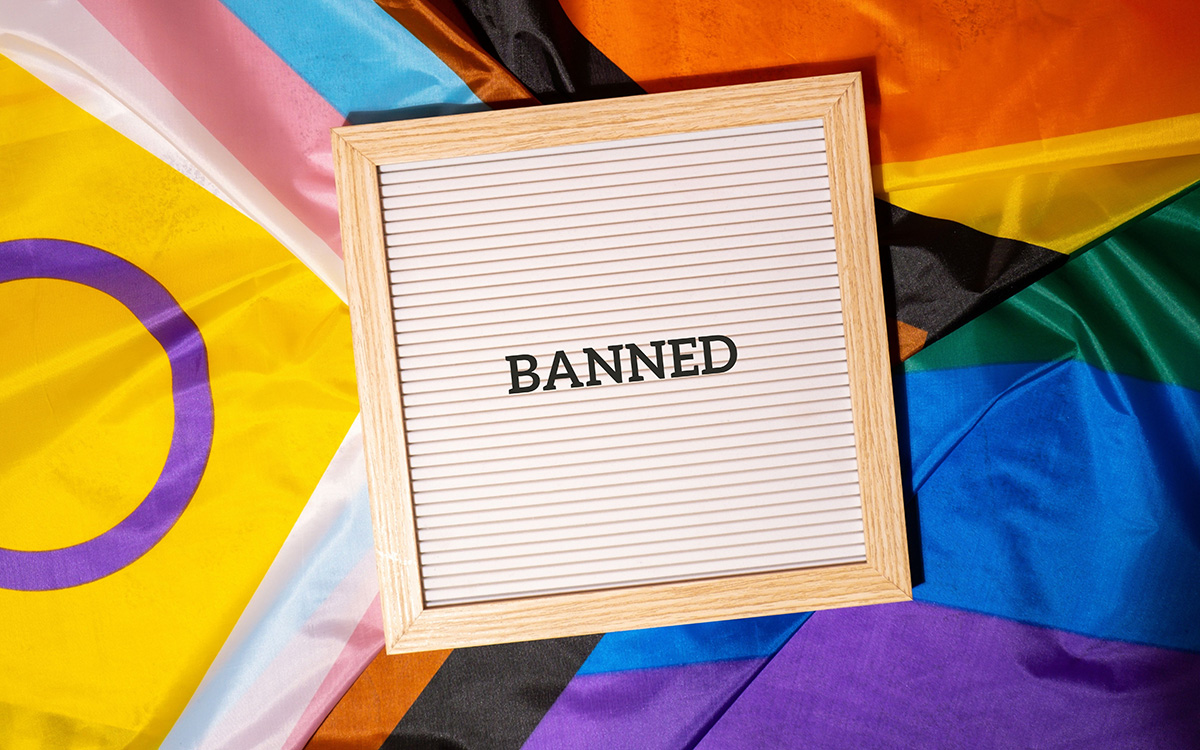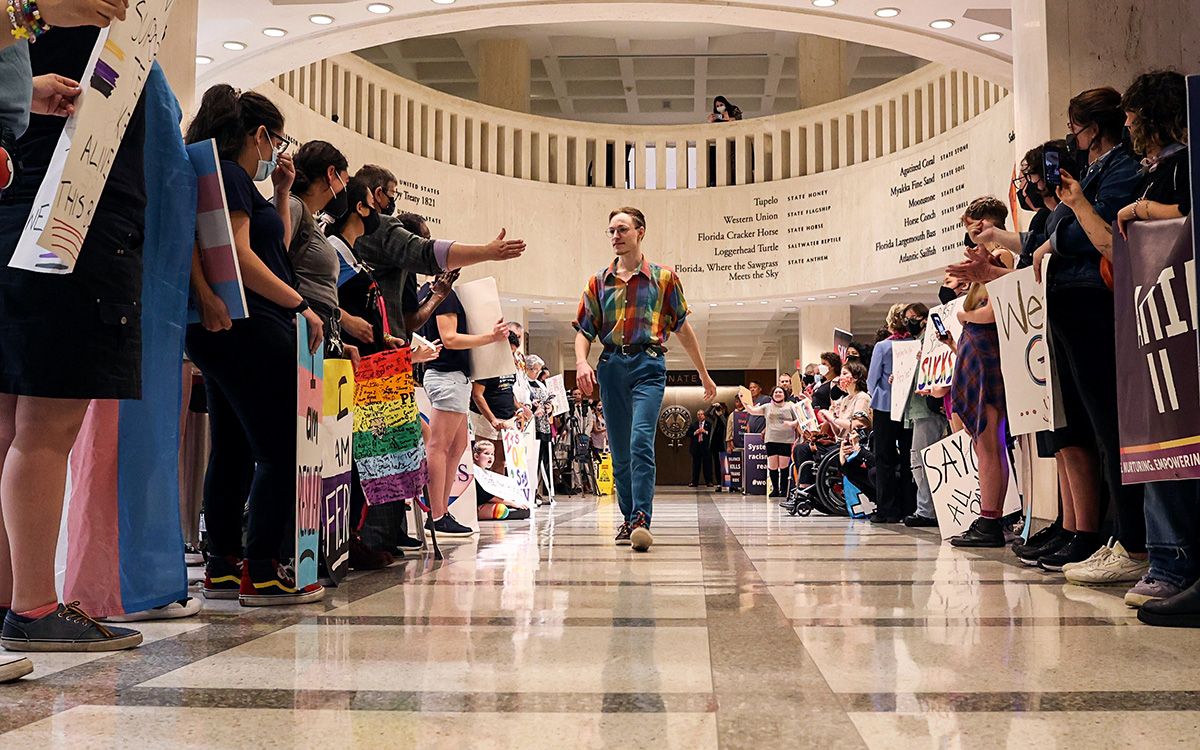National
From LGBTQ book bans to internet bans: A bipartisan attack on knowledge
Online safe spaces for queer youth increasingly at risk

“They had LGBTQ-inclusive books in every single classroom and school library,” Maxx Fenning says of his high school experience. “They were even working on LGBTQ-specific course codes to get approved by the state,” he said, describing courses on queer studies and LGBTQ Black history.
No, Fenning didn’t grow up in Portland or a Boston suburb. Fenning graduated from a South Florida high school in 2020. Florida’s transformation from mostly affirming to “Don’t Say Gay” has been swift, he says. “It feels like a parallel universe.”
Fenning, who just graduated from the University of Florida, follows the developments closely as the executive director of PRISM FL Inc., a youth-led LGBTQ nonprofit he founded at 17. “I’ve watched so many of the things that I kind of took advantage of be stripped away from all of the students that came after me,” Fenning says. “It’s one thing to be in an environment that’s not supportive of you. It’s another thing to be in an environment that’s supportive of you and then watch it fall apart.”
“It’s just gut-wrenching,” Fenning explained, describing how Florida’s increasingly hostile legislation has transformed the state he has lived in most of his life.
Most recently, Florida passed HB3, “Online Protections for Minors,” which bans youth under 14 from having social media accounts. Youths aged 14 and 15 need parental consent before getting accounts and any minor must be protected from “harmful content” online.
Unlike the previous legislation, which came predominately from the right and directly targeted issues like gender-affirming healthcare or DEI, HB3 is part of a bipartisan push across the country to regulate social media, specifically for youth. HB3 was co-sponsored by Michele K. Rayner, the openly queer Black member of the Florida Legislature, alongside many of her colleagues across the aisle. Similar national legislation, like Kids Online Safety Act, includes 68 Democratic and Republican sponsors.
Shae Gardner, policy director at LGBT Tech, explains that this legislation disproportionately harms LGBTQ youth, regardless of intentions or sponsors.
Gardner says that while all these bills claim they are for the safety of kids, for LGBTQ youth, “you are putting them at risk if you keep them offline.” She explains that “a majority of LGBTQ youth do not have access to affirming spaces in their homes and their communities. They go online to look like that. A majority say online spaces are affirming.”
Research by the Trevor Project, which reports that more than 80% of LGBTQ youth “feel safe and understood in specific online spaces” backs this up. Specific online spaces that are under target from legislation, like TikTok, are disproportionately spaces where LGBTQ youth of color feel safest.
“For LGBTQ people, social media has provided spaces, which are, at once both public and private, that encourage, and enhance … a great deal of self-expression that is so important for these communities,” confirms Dr. Paromita Pain, professor, Global Media Studies & Cybersecurity at University of Nevada, Reno. She is the editor of the books “Global LGBTQ Activism” and “LGBTQ digital cultures.”
Fenning emphasizes that with bills like “Don’t Say Gay,” in Florida — and other states including North Carolina, Arkansas, Iowa, and Indiana — LGBTQ youth have less access to vital information about their health and history. “Social media [are] where young people increasingly turn to get information about their community, their history, their bodies and themselves.”
At PRISM, Fenning works to get accurate, fact-backed information to Florida youth through these pathways, ranging from information on health and wellbeing to LGBTQ history to current events. The feedback has been overwhelmingly positive. Often youth tell him “I wish I learned this in school,” which is a bittersweet feeling for Fenning since it represents how much young LGBTQ youth are missing out on in their education.
Morgan Mayfaire, executive director of TransSOCIAL, a Florida advocacy group, said that these internet bans are an extension of book bans, because when he was a teen, books were his pathway into the LGBTQ community. “For me it was the library and the bookstores that we knew were LGBTQ friendly.” Now 65, Mayfaire understands that “kids today have grown up with the internet. That’s where they get all their information. You start closing this off, and you’re basically boxing them in and closing every single avenue that they have. What do you think is going to happen? Of course, it’s going to have an impact emotionally and mentally.”
Fenning says that social media and the internet were powerful to him as a teen. “I was able to really come into my own and learn about myself also through social media. It was really powerful for me, building a sense of self.” Gardner agrees, sharing that legislation like this, which would have limited “15-year-old me, searching ‘if it was OK to be gay’ online, would have stagnated my journey into finding out who I was.”
Gardner also explains that many of the bills, like HB3, limit content that is “harmful” or “obscene” but do not specifically define what that content is. Those definitions can be used to limit LGBTQ content.
“Existing content moderation tools already over-censor LGBTQ+ content and users,” says Gardner, “they have a hard time distinguishing between sexual content and LGBTQ+ content.” Pain emphasizes that this is no accident, “there are algorithms that have been created to specifically keep these communities out.”
With the threat of fines and litigation from HB3, says Gardner, “moderation tools and the platforms that use them is only going to worsen,” especially since the same legislators may use the same terms to define other queer content like family-friendly drag performances.
In addition to being biased, it has devastating effects on LGBTQ youth understanding of their sense of identity, Fenning explains. “That perception of queer people as being overly sexual or their relationships and love being inherently sexual in a way that other relationships aren’t does harm to our community.”
Gardner acknowledges that online safety has a long way to go — pointing to online harassment, cybercrime, and data privacy—but that these bills are not the correct pathways. She emphasizes “everybody’s data could be better protected, and that should be happening on a federal level. First and foremost, that should be the floor of protection.”
She also emphasizes that content moderation has a long way to go from targeting the LGBTQ community to protecting it. “Trans users are the most harassed of any demographic across the board. That is the conversation I wish we were having, instead of just banning kids from being online in the first place.”
Being queer on the ground in Florida is scary. “The community is very fearful. This [legislation] has a big impact on us,” explains Mayfaire.
“I mean, it sucks. Right?” Fenning chuckles unhappily, “to be a queer person in Florida. In a state that feels like it is just continuously doing everything it can to destroy your life and all facets and then all realms.”
Despite the legislative steamrolling, several court wins and coordinated action by LGBTQ activists help residents see a brighter future. “There’s a weird tinge of hope that that has really been carrying so many queer people and I know myself especially this year as we’re seeing the rescinding of so many of these harmful policies and laws.”

For example, this March, Florida settled a challenge to its “Don’t Say Gay” legislation that significantly lessens its impact. Already, experts warn that HB3 will face legal challenges.
Pain emphasizes that social media is central to LGBTQ activism, especially in Florida. “There have been examples of various movements, where social media has been used extremely effectively, to put across voices to highlight issues that they would not have otherwise had a chance to talk about,” she says, specifically citing counteraction to “Don’t Say Gay.” That is another reason why legislation like this disproportionately harms LGBTQ people and other minority groups, it limits their ability to organize.
Fenning emphasizes that HB3 directly attacks spaces like PRISM, which do not just share information for the LGBTQ community, but provide spaces for them. “Foundationally it provides an opportunity for the community,” he says, but more than anything, it provides a space, where “you can you can learn from your queer ancestors, so to speak, and take charge.” And that is invaluable.
(This story is part of the Digital Equity Local Voices Fellowship lab through News is Out. The lab initiative is made possible with support from Comcast NBCUniversal.)
Federal Government
UPenn erases Lia Thomas’s records as part of settlement with White House
University agreed to ban trans women from women’s sports teams

In a settlement with the Trump-Vance administration announced on Tuesday, the University of Pennsylvania will ban transgender athletes from competing and erase swimming records set by transgender former student Lia Thomas.
The U.S. Department of Education’s Office for Civil Rights found the university in violation of Title IX, the federal rights law barring sex based discrimination in educational institutions, by “permitting males to compete in women’s intercollegiate athletics and to occupy women-only intimate facilities.”
The statement issued by University of Pennsylvania President J. Larry Jameson highlighted how the law’s interpretation was changed substantially under President Donald Trump’s second term.
“The Department of Education OCR investigated the participation of one transgender athlete on the women’s swimming team three years ago, during the 2021-2022 swim season,” he wrote. “At that time, Penn was in compliance with NCAA eligibility rules and Title IX as then interpreted.”
Jameson continued, “Penn has always followed — and continues to follow — Title IX and the applicable policy of the NCAA regarding transgender athletes. NCAA eligibility rules changed in February 2025 with Executive Orders 14168 and 14201 and Penn will continue to adhere to these new rules.”
Writing that “we acknowledge that some student-athletes were disadvantaged by these rules” in place while Thomas was allowed to compete, the university president added, “We recognize this and will apologize to those who experienced a competitive disadvantage or experienced anxiety because of the policies in effect at the time.”
“Today’s resolution agreement with UPenn is yet another example of the Trump effect in action,” Education Secretary Linda McMahon said in a statement. “Thanks to the leadership of President Trump, UPenn has agreed both to apologize for its past Title IX violations and to ensure that women’s sports are protected at the university for future generations of female athletes.”
Under former President Joe Biden, the department’s Office of Civil Rights sought to protect against anti-LGBTQ discrimination in education, bringing investigations and enforcement actions in cases where school officials might, for example, require trans students to use restrooms and facilities consistent with their birth sex or fail to respond to peer harassment over their gender identity.
Much of the legal reasoning behind the Biden-Harris administration’s positions extended from the 2020 U.S. Supreme Court case Bostock v. Clayton County, which found that sex-based discrimination includes that which is based on sexual orientation or gender identity under Title VII rules covering employment practices.
The Trump-Vance administration last week put the state of California on notice that its trans athlete policies were, or once were, in violation of Title IX, which comes amid the ongoing battle with Maine over the same issue.
New York
Two teens shot steps from Stonewall Inn after NYC Pride parade
One of the victims remains in critical condition

On Sunday night, following the annual NYC Pride March, two girls were shot in Sheridan Square, feet away from the historic Stonewall Inn.
According to an NYPD report, the two girls, aged 16 and 17, were shot around 10:15 p.m. as Pride festivities began to wind down. The 16-year-old was struck in the head and, according to police sources, is said to be in critical condition, while the 17-year-old was said to be in stable condition.
The Washington Blade confirmed with the NYPD the details from the police reports and learned no arrests had been made as of noon Monday.
The shooting took place in the Greenwich Village neighborhood of Manhattan, mere feet away from the most famous gay bar in the city — if not the world — the Stonewall Inn. Earlier that day, hundreds of thousands of people marched down Christopher Street to celebrate 55 years of LGBTQ people standing up for their rights.
In June 1969, after police raided the Stonewall Inn, members of the LGBTQ community pushed back, sparking what became known as the Stonewall riots. Over the course of two days, LGBTQ New Yorkers protested the discriminatory policing of queer spaces across the city and mobilized to speak out — and throw bottles if need be — at officers attempting to suppress their existence.
The following year, LGBTQ people returned to the Stonewall Inn and marched through the same streets where queer New Yorkers had been arrested, marking the first “Gay Pride March” in history and declaring that LGBTQ people were not going anywhere.
New York State Assemblywoman Deborah Glick, whose district includes Greenwich Village, took to social media to comment on the shooting.
“After decades of peaceful Pride celebrations — this year gun fire and two people shot near the Stonewall Inn is a reminder that gun violence is everywhere,” the lesbian lawmaker said on X. “Guns are a problem despite the NRA BS.”
New York
Zohran Mamdani participates in NYC Pride parade
Mayoral candidate has detailed LGBTQ rights platform

Zohran Mamdani, the candidate for mayor of New York City who pulled a surprise victory in the primary contest last week, walked in the city’s Pride parade on Sunday.
The Democratic Socialist and New York State Assembly member published photos on social media with New York Attorney General Letitia James, telling followers it was “a joy to march in NYC Pride with the people’s champ” and to “see so many friends on this gorgeous day.”
“Happy Pride NYC,” he wrote, adding a rainbow emoji.
Mamdani’s platform includes a detailed plan for LGBTQ people who “across the United States are facing an increasingly hostile political environment.”
His campaign website explains: “New York City must be a refuge for LGBTQIA+ people, but private institutions in our own city have already started capitulating to Trump’s assault on trans rights.
“Meanwhile, the cost of living crisis confronting working class people across the city hits the LGBTQIA+ community particularly hard, with higher rates of unemployment and homelessness than the rest of the city.”
“The Mamdani administration will protect LGBTQIA+ New Yorkers by expanding and protecting gender-affirming care citywide, making NYC an LGBTQIA+ sanctuary city, and creating the Office of LGBTQIA+ Affairs.”




















